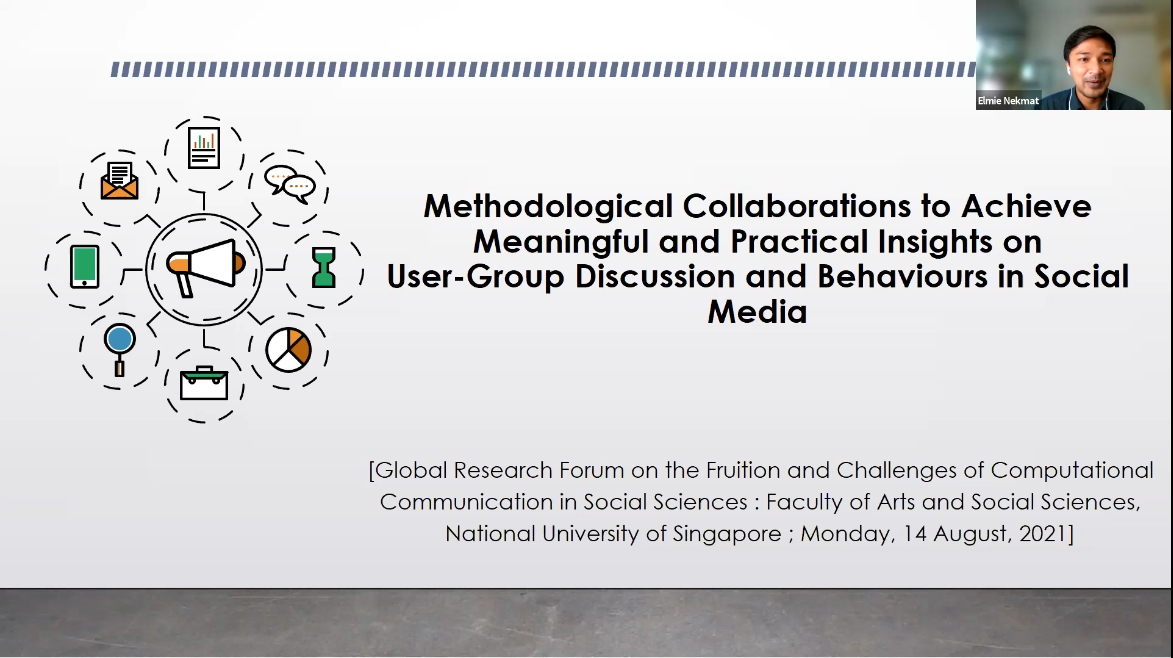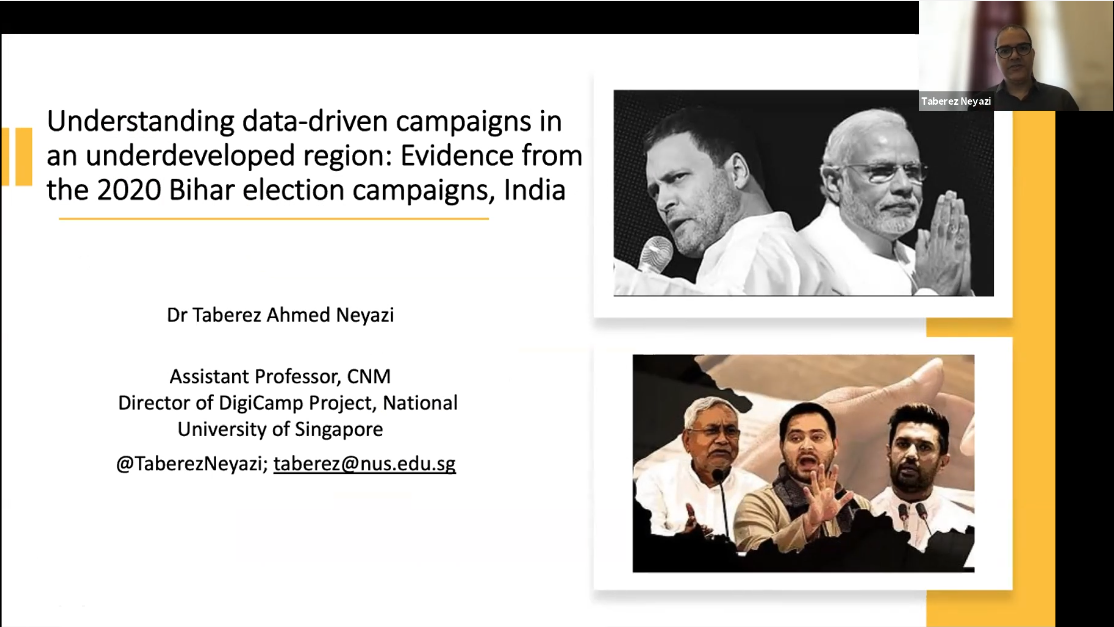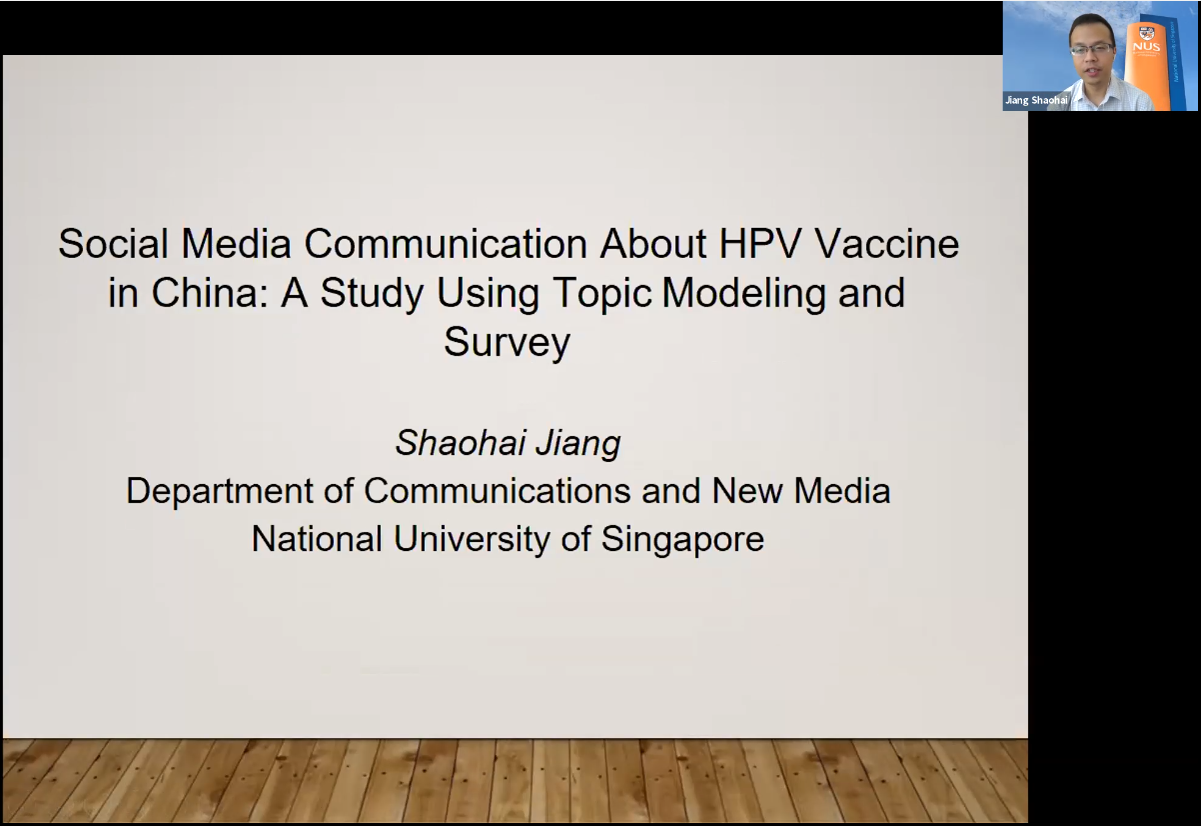FASS Global Research Forum: ‘Social Media: Human Behavior and Response’ – Presentations from NUS Department of Communications and New Media
September 17, 2021
On Day 1 of the FASS Global Research Forum, following the two keynote speeches, the first theme, ‘Social Media: Human Behavior and Response’, showcased research by NUS Department of Communications and New Media faculty members Associate Professor Elmie Nekmat, Assistant Professor Kokil Jaidka, Assistant Professor Taberez Neyazi, and Assistant Professor Jiang Shaohai.

Assoc Prof Nekmat presented on ‘Methodological Collaborations to Achieve Meaningful and Practical Insights on User-Group Discussion and Behaviours in Social Media’. He talked about his study on crisis collective memory making on social media that focused on three Chinese crises on Weibo – the 2010 Yushu Earthquake, the 2015 Tianjin Explosions, and the 2018 Vaccine Scandal. The project presented the challenge of analyzing a huge trove of data and using it to better understand how a diverse group of social media actors (including those from government and the private sector) shape the collective memory of a crisis. Assoc Prof Nekmat explained that collective memory making is a process where humans collectively shape the memory narratives of a previous incident. These narratives typically express themes of identity, nationalism, trauma, and power and contestation, and the research links them to the collective sense-making that occurs in crisis communication.
The study found that during natural disasters, the most common response on social media (among the categories in the study’s crisis response framework) was to inform others of the crisis, and that the government used a narrative of trauma most, and more than the general public, when talking about the disaster. Additionally, while the public frequently employed a narrative of power and contestation, the government used this narrative the least.
Asst Prof Jaidka presented on ‘Trivium: A Custom-built Experimental Platform to Inform Social Media Design for Better Conversation Health’, which she plans in future to release open-source for other researchers to utilize. She explained that Trivium allows users to create experimental conditions with different treatments of anonymity, interactivity, social presence, social cues, persistence, editability, and conversation control, which is very useful for studying how social media users behave. The platform includes the ability for bots to be trained to interact with users in a variety of ways. Asst Prof Jaidka discussed how Trivium can be used to test the effect of anonymity (social and personal) and other affordances of social media on people’s discussions, particularly the nature of the discussion and its outcome. She has found from her studies on the platform (with American users) that personal anonymity as well as social identfiability (users are identified by online nicknames or handles and not personal names) can lead to higher quality deliberations during discussions, and that personal anonymity coupled with social identifiability during discussions may cause participants to change their opinion.

Asst Prof Neyazi presented on ‘Understanding Data-driven Campaigns in an Underdeveloped Region: Evidence from the 2020 Bihar Election campaigns, India’. He spoke about his Digital Campaign (DigiCamp) Asia project, which seeks to understand how political actors use digital platforms like Facebook for campaigning and mobilizing voters with particular focus on Asia, and applies a computational approach to answer questions related to political communication. The project will ideally help members of the public make more informed decisions, allow journalists to glean quick insights into the digital campaigns of political parties, and enable technology companies to better understand how their products are being used in online political campaigns. The research also looked at the extent to which digital campaigns leverage on polarization and use incivility, and how to reduce incivility from and work to depolarize the political conversation.
Asst Prof Neyazi emphasized that digital campaigns have great potential to influence public opinion and thus election outcomes, and that it is important to pay attention to how the media channels the emotions invoked by political leaders. He brought up Affective Intelligence Theory (AIT), which holds that emotions, which include anger, enthusiasm, and anxiety, are at minimum partially responsible for influencing people’s involvement in the political campaign process. Asst Prof Neyazi pointed out that AIT needs to take the emotion of hope into account more, and that his research looks at how hope has been deployed in campaign rhetoric to mobilize voters, typically by opposition figures. His study included a two-wave panel survey, analysis of political advertising and Crowdtangle data on Facebook, and analysis of Tweets. Asst Prof Neyazi explained how political advertising by a variety of parties in the 2020 Bihar election that employed different emotions led to differing levels of user engagement on Facebook and Twitter.

Asst Prof Jiang presented on ‘Social Media Communication about HPV Vaccine in China: A Study Using Topic Modeling and Survey’. He stated that public awareness of the human papilloma virus (HPV) is low in China and social media is an important means of learning about it and seeking general health information, as it allows real-time news sharing and collaborative learning. However, while some research has shown that social media use boosts health knowledge, other studies argued it had inconsistent or negative effects on health knowledge. Asst Prof Jiang explained that these inconsistent findings reveal that it is unclear what topics will lead to which health outcome, and the varying ways people get information can affect the outcome. In addition, while passively consuming health information can raise one’s awareness, active searches and discussions are necessary in order to have a broader and deeper understanding of a health problem.
Asst Prof Jiang’s two-part project examined the different topics of health information on social media and explored how social media users scan, seek out, and discuss these topics connects to their health knowledge and related outcomes. He focused on how HPV vaccine information scanning, seeking, and discussing on social media is associated with users’ HPV vaccine knowledge and attitude, and their intention to get vaccinated. Asst Prof Jiang gathered posts from July 2018 through June 2019 on Weibo in China, with the dates selected because the 9-valent HPV vaccine was approved there in June 2018. He found that the vaccine was discussed around the following topics (in descending order): advertisements, guidance information, personal experience, vaccine policy information, vaccine scandals, and HPV risks. Moreover, his January 2020 online survey demonstrated that, among other health outcomes, social media scanning information about vaccine policy reduced safety concerns about the vaccine, while scanning information about HPV vaccine scandals increased safety concerns. Additionally, seeking out knowledge about HPV vaccine policies and guidance information enhanced knowledge, while seeking out advertising and scandals had a negative impact on knowledge. Similarly, discussing policy and guidance information had a beneficial effect and discussing advertising and scandals had a harmful effect.
Asst Prof Jiang explained that, unlike advertising, which does not advocate for public good, guidance information and personal experience were associated with positive health outcomes, as they enabled users to better understand new health issues, facilitate informed decision-making, and glean knowledge from peers with similar needs. He advocated for future social media campaigns to provide more details and clearer instructions on recommended health behaviors. Furthermore, because HPV vaccine scandals reduced knowledge and increased concerns about vaccine safety, countering fake and counterfeit vaccine proliferation has grown in urgency.
Watch the video from Theme 1: ‘Social Media: Human Behavior and Response’ here.

